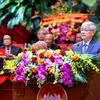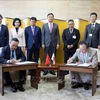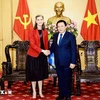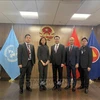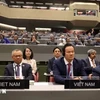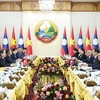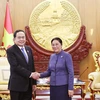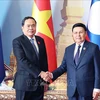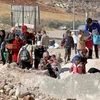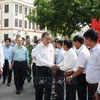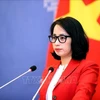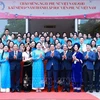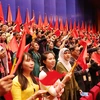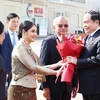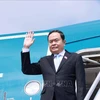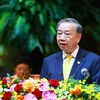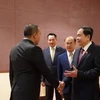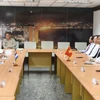Prime Minister Nguyen Tan Dung highlighted the importance of creating and promoting a regional architecture for peace, security and prosperity in East Asia at the 8th East Asia Summit (EAS) in Brunei on October 10.
The Vietnamese leader said the region is seeing new and great opportunities in peace, cooperation, linkage and development, but still faces many challenges.
He stressed that the EAS, as a forum of regional leaders, should therefore promote its active and decisive role in ensuring peace, security and development cooperation in the region on the basis of complying with international law, building and sharing standards of conduct, and building strategic trust.
The EAS needs to promote its role as an important part of the regional architecture to guarantee the above-mentioned objectives and step up cooperation in order to create momentum for the growth and development of the regional linkage, connectivity and integration, he said.
The PM suggested ASEAN and the EAS put forth a development agenda and priority objectives in line with the UN’s new criteria.
He also asked countries to increase efforts to prevent the proliferation of nuclear weapons and other mass destructive ones, adding that Vietnam will join the Proliferation Security Initiative (PSI) at an early date.
Regarding the East Sea issue, PM Dung emphasised the importance of ensuring peace, stability, security and trust building in the East Sea, addressing disputes by peaceful means on the basis of strictly abiding by international law, including the 1982 UN Convention on the Law of the Sea (1982 UNCLOS).
He urged ASEAN and China to fully and effectively implement the Declaration of the Conduct of Parties in the East Sea (DOC) and work towards the formation of a Code of Conduct in the East Sea (COC).
At the summit, the leaders discussed EAS issues of strategic importance in all aspects, including politics-security and development in the region.
They agreed that the EAS should continue to step up cooperation to ensure an environment of peace, stability and security in the region; expand linkage and connectivity; and strengthen cooperation in other priority areas such as finance, energy, education, epidemic and natural disaster management, and ASEAN Connectivity.
The leaders applauded the implementation of the East Asia Development Initiative and adopted the EAS Declaration on Food Security, which encourages responsible investment in agricultural production, scientific and technological research in the farming sector, expand fishery management cooperation, and the sustainable management and use of water and forest resources.
They laid special emphasis on strengthening cooperation in ensuring regional peace, stability and security, including maritime security, safety and freedom in the East Sea , as well as in preventing and fighting pirates, search and rescue at sea, and maritime environment and security.
The leaders highlighted the principle of solving disputes by peaceful measures in accordance with international law and the 1982 UNCLOS, and seriously implementing the DOC and other reached agreements in parallel with the early formation of a COC.
They also agreed to speed up negotiations so that the Regional Comprehensive Economic Partnership Agreement (RCEP) can be accomplished by 2015.-VNA
The Vietnamese leader said the region is seeing new and great opportunities in peace, cooperation, linkage and development, but still faces many challenges.
He stressed that the EAS, as a forum of regional leaders, should therefore promote its active and decisive role in ensuring peace, security and development cooperation in the region on the basis of complying with international law, building and sharing standards of conduct, and building strategic trust.
The EAS needs to promote its role as an important part of the regional architecture to guarantee the above-mentioned objectives and step up cooperation in order to create momentum for the growth and development of the regional linkage, connectivity and integration, he said.
The PM suggested ASEAN and the EAS put forth a development agenda and priority objectives in line with the UN’s new criteria.
He also asked countries to increase efforts to prevent the proliferation of nuclear weapons and other mass destructive ones, adding that Vietnam will join the Proliferation Security Initiative (PSI) at an early date.
Regarding the East Sea issue, PM Dung emphasised the importance of ensuring peace, stability, security and trust building in the East Sea, addressing disputes by peaceful means on the basis of strictly abiding by international law, including the 1982 UN Convention on the Law of the Sea (1982 UNCLOS).
He urged ASEAN and China to fully and effectively implement the Declaration of the Conduct of Parties in the East Sea (DOC) and work towards the formation of a Code of Conduct in the East Sea (COC).
At the summit, the leaders discussed EAS issues of strategic importance in all aspects, including politics-security and development in the region.
They agreed that the EAS should continue to step up cooperation to ensure an environment of peace, stability and security in the region; expand linkage and connectivity; and strengthen cooperation in other priority areas such as finance, energy, education, epidemic and natural disaster management, and ASEAN Connectivity.
The leaders applauded the implementation of the East Asia Development Initiative and adopted the EAS Declaration on Food Security, which encourages responsible investment in agricultural production, scientific and technological research in the farming sector, expand fishery management cooperation, and the sustainable management and use of water and forest resources.
They laid special emphasis on strengthening cooperation in ensuring regional peace, stability and security, including maritime security, safety and freedom in the East Sea , as well as in preventing and fighting pirates, search and rescue at sea, and maritime environment and security.
The leaders highlighted the principle of solving disputes by peaceful measures in accordance with international law and the 1982 UNCLOS, and seriously implementing the DOC and other reached agreements in parallel with the early formation of a COC.
They also agreed to speed up negotiations so that the Regional Comprehensive Economic Partnership Agreement (RCEP) can be accomplished by 2015.-VNA
